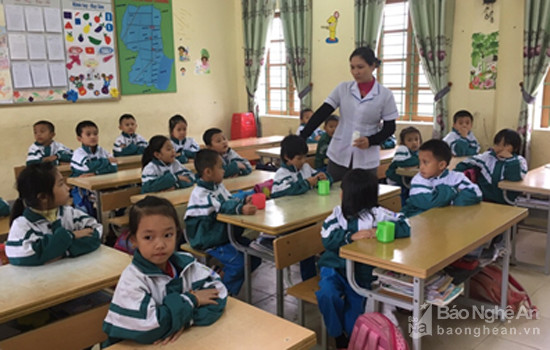Raising community awareness of helminthic disease prevention
(Baonghean) -In order to reduce the rate of infection with soil-transmitted helminths in preschool children and school-age children, in recent times, the Provincial Center for Preventive Medicine has implemented many programs and projects to contribute to raising awareness among students, teachers, health workers and people about preventing soil-transmitted helminths and improving environmental sanitation, personal hygiene, and improving community health.
 |
| Deworming for students of Luu Son Primary School (Do Luong) phase 2. Photo: Nguyet Minh |
According to the investigation of the Ministry of Health, the situation of worm infection in preschool children aged 2-5 is very alarming, in Nghe An the rate of worm infection is up to nearly 80%. The general infection rate in children aged 2-5 is 34%. The high rate of worm infection is closely related to factors such as: Geographical, climatic and environmental conditions, poor hygiene habits and behaviors. Building a program to prevent soil-transmitted helminth infections in the community and schools, especially in preschool and primary school children, has become an urgent and necessary issue in medical activities and primary health care.
In order to contribute to disease prevention, including the prevention of soil-transmitted helminth diseases, and improve people's health, since March 2015, the Ministry of Health has implemented the Project "Prevention of soil-transmitted helminth diseases through improving environmental sanitation and personal hygiene in some provinces of Vietnam", including Nghe An. Accordingly, the project carries out activities to prevent helminths, provide health education in schools and change the behavior of primary school students, creating conditions for them to develop comprehensively physically and mentally, and have good health to study.
The project focuses on training activities for staff who administer deworming medication to students. The purpose of these training sessions is to provide information about the project and provide detailed instructions to staff at all levels on how to implement the program.
Provide guidance on how to handle unwanted side effects during mass deworming for primary school students in communes where the project is implemented. In addition, the project organizes training courses on communication skills in coordination with training courses on worm prevention to improve communication skills to change behavior for staff implementing communication work at the commune level; such as skills: Group discussion, household visiting skills, organizing village meetings, etc.
The project will conduct mass deworming (MDA) for all primary school students in 4 provinces including Nghe An, Hoa Binh, Phu Tho and Thanh Hoa. It is estimated that over 905 thousand children from 2,634 preschools and primary schools will receive deworming medicine through the program. Mass deworming will be organized every 6 months and will take place a total of 6 times in the 3 years of project implementation (from 2015 to 2018). The project will use Albendazole 400mg and Mebendazole 500mg as deworming medicine. On deworming day at school, commune health workers will directly distribute deworming medicine to primary school students. For preschool children, deworming day will be organized at the commune health station through nutrition programs or other programs.
In addition to the regular distribution of deworming medicine, the project will conduct interventions to improve knowledge about hygiene behaviors, contributing to changing awareness and personal hygiene behaviors for students; thereby reducing the rate of worm re-infection in children. Along with that, the project will provide financial support to a number of schools to renovate and repair kitchens for primary school students and hand washing areas with soap in the toilets, to improve hygiene conditions. The schools selected for support will be selected by EMW in coordination with the Provincial Center for Preventive Medicine, the Department of Education and Training of the project provinces according to the criteria set by EMW.
In addition, the project will provide funding for provinces to carry out communication activities to raise awareness and change hygiene behaviors in the community. The Provincial Center for Preventive Medicine will coordinate with relevant units to develop and broadcast communication reports on personal hygiene, environmental sanitation to prevent soil-transmitted helminth diseases through the radio or television system; build communication poster clusters; organize propaganda competitions on helminth prevention in schools. The Provincial Center for Preventive Medicine will coordinate with other organizations to carry out communication activities in the community through village meetings, integrated meetings on disease prevention and hygiene; organize visits to households, etc.
The project has been implemented since March 2015 and has brought about positive results. Project staff are equipped with skills in propaganda and community mobilization to change behaviors that affect people's health. In addition, the activities and results of the project have contributed to raising people's awareness of health care and protection, disease control, and influencing changes in behaviors and practices that are not beneficial to health.
At the same time, the project also supports regular deworming for preschool and primary school children in the provinces where the project is implemented; supports the construction of toilets and provides hand washing facilities in some primary schools; helps students form healthy habits. The project also conducts hygiene interventions to improve knowledge about hygiene behaviors through intervention packages such as: Comic books on communication messages, hygiene education curriculum through games, videos and hand washing soap with toys. These measures will contribute to changing the hygiene behavior of primary school students, as well as changing the awareness and hygiene behavior of their family members.
In the coming time, the Project Steering Committee at the provincial, district and commune levels will be established or strengthened based on the existing steering committees on epidemic prevention to ensure the good implementation of project activities; manage, coordinate, supervise and closely coordinate with other associations, departments, sectors and organizations such as: Women's Union, Social Policy Bank, Farmers' Association, Fatherland Front... to effectively implement project activities.
Moonlight
| RELATED NEWS |
|---|
